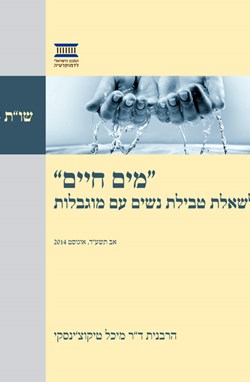Handicapped Accessibility and the Mikveh
- Written By: Michal Tikochinsky
- Publication Date:
- Number Of Pages: 37 Pages
- Center: Human Rights and Judaism
A contemporary responsum that offers real-world solutions that can protect the dignity and privacy of women with disabilities who seek to immerse in a Jewish ritual bath.
Women with disabilities face several problems when they go to immerse in the mikveh (ritual bath). These fall into two main categories: the technical difficulty of entering a pool of water reached by steps and the need for respect for the dignity and privacy of the woman who is immersing.
In Israel, few mikvehs are equipped with a wheelchair lift to lower a woman into the pool. Such lifts also have operational limitations and are expensive to install. Moreover, even when a mikveh is equipped with such a lift, the woman needs physical assistance from the mikveh attendant to immerse, which exposes her to the eyes of a stranger. Most people would feel uncomfortable in such a situation, and women with disabilities or physical deformities all the more so.
The obligation to recognize the concerns related to the dignity of a woman with disabilities who immerses in a mikveh underlies the discussion in this booklet, which was written by Dr. Michal Tikochinsky under the auspices of IDI's Human Rights and Judaism in Action project.
This project has been made possible by the generous support of
The Ruderman Family Foundation
and an anonymous foundation operating in Israel
- It is proposed to investigate the options for the mikveh's design and develop an inexpensive and easy-to-implement architectural solution, even if this means giving up halakhic stringencies or practices that are preferable according to Jewish law.
- It is recommended to construct a sort of bathtub adjacent to the immersion pool, which is linked to it, such that the water in the tub and in the pool is connected.
- To solve the problem of exposure of the woman’s body, it is recommended that the woman be permitted to immerse while wearing a robe. This solution should be considered as an acceptable means for any woman who wishes to employ it and feels a need for privacy in the presence of the mikveh attendant.
Rabbanit Dr. Michal Tikochinsky is head of the Moshe Green Women’s Beit Midrash at Beit Morasha of Jerusalem.


